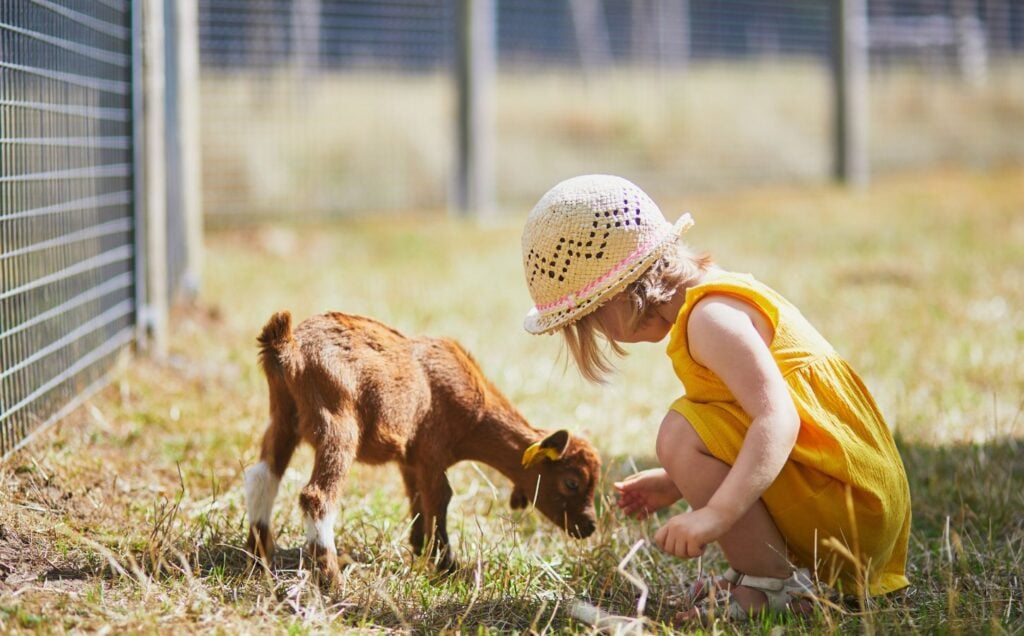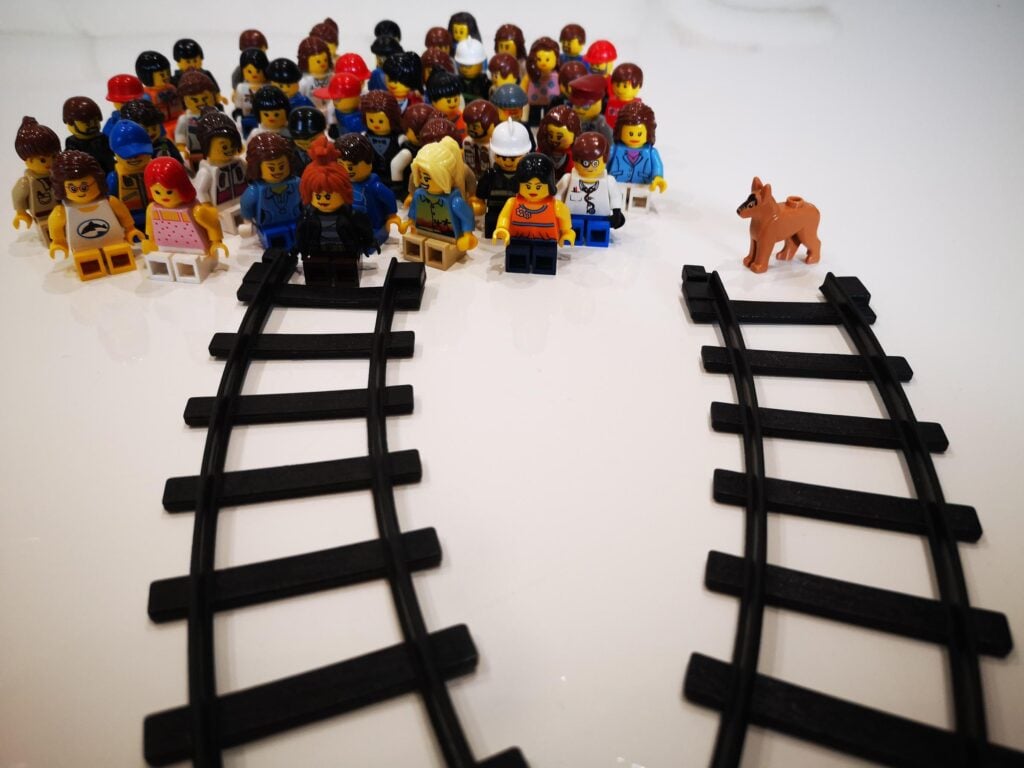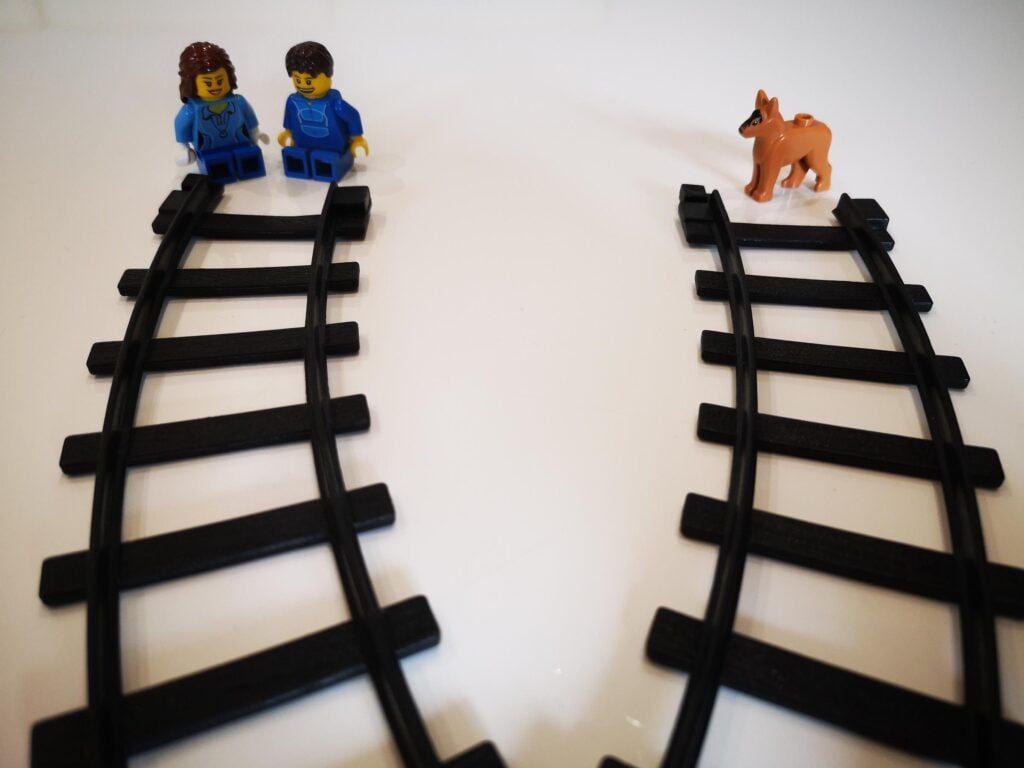If it came down to saving the life of a dog or saving a human, more young children would choose to save the animal compared to adults who would save the person, researchers found in a new study. No less than 40 percent of young children prioritized non-human animals over human life in a “trolley problem” study, where they were made to choose whether a toy trolley would either travel along tracks and run over a toy animal or a different set of tracks that would steer the trolley to crash into human figurines.
When given the choice of saving human life or animal life, more kids would choose to spare the lives of animals more often than adults would, which indicates that “species bias” is learned, not innate.
That’s the latest finding of a moral dilemma study from researchers at the University of Edinburgh. They asked Polish children ages six to nine whether they would choose to save the lives of dogs over humans, or alternatively chimps over humans. Perhaps not surprisingly, more of the children said they would spare the animal as compared to answers given by adults faced with the same dilemma. Adults said that if they had to choose which life to save, they would save the human.
The study is an update of one in which species bias decisions compared dogs, pigs, and humans and asked the same question. The researchers used the “unmanned trolley” dilemma: If the toy trolley tracks pointed at animal figures or human figures, and the only choice was whether the toy trolley were to go left to where the toy animal was positioned (in this case using Lego figurines) versus a group of people (also depicted by Lego figurines placed at the end of the other set of tracks), more of the kids chose to send the toy trolley away from the animals, so it would be fated to run over the toy humans.
Species bias is stronger in adults
Compared to adults, the kids chose to save animals more often, and the researchers were exploring where and how “species bias” gets introduced into our lives. When the same dilemma was posed to Polish and American youngsters, the American children saved animals more often than their Polish counterparts. The trolley problem has been used for decades to determine development of ethics.
More adults express species bias than children, and even among animals, there is species bias that favors dogs over others. All of the children were more likely to save dogs than they were to save chimps, the study found, perhaps because pets make dogs more relatable than other types of animals.
The study was a way of seeing when and where the idea of species bias appears in a child’s development and why children express less bias than adults do. The researchers are trying to gain a better understanding of when and how human superiority develops, especially when it comes to valuing the lives of humans over the lives of animals.
“Most people believe that the life of a human is more valuable than the life of an animal,” the authors write in the study. “For example, in the ‘moral machine’ experiment, where participants decide who should be killed by an autonomous car, adults in 233 countries and territories prioritize humans over animals.”
The study cited past research that had found that people were more willing to kill animals to save human beings than to save animals and allow humans to perish. This latest research suggests that “people, at least in part, morally prioritize humans over animals based merely on species membership.”
Would you give a snack to a person or an animal?
The other question that was asked of the study participants was about giving a snack to the animals. More children would give snacks to animals than to humans (which may not be surprising since they perceived that the animals needed the snack more than the people did). Even adults chose to offer the snack to animals over humans.
In all the hypothetical scenarios (either harmful outcome of smashing the trolley into the toy figures, or the choices of who to benefit with a snack) the dogs fared better than the chimps. The children indicated they would save dogs more often than humans and while they would also save chimps, the monkeys fared less well statistically in this moral dilemma study, perhaps not so surprising given the number of households that have dogs as pets.
The lives of humans vs. animals
The study is a replication, extension, and deeper dive into the findings of an earlier study done in 2021 that found the same tendencies but also included pigs in the questions. To be clear, not all children would make the choice to save the animals over humans, but nearly half would, which is a higher rate than adults reported. Adults would more often make the opposite decision: They would save the person
The discrepancy between the decisions a young child would make versus an adult suggest that this species priority is weaker in children and grows stronger over the years and decades as people age. “Children as young as five would often choose to save two dogs and six pigs over one human being,” the study found. Adults given the same moral dilemma would prefer to save a human over 100 animals.
More children chose to save animals over people
Almost half of young children queried would prefer to save the lives of animals, whereas most adults say they would save the person if pressed. “The finding really surprised us,” says Matti Wilks at the University of Edinburgh in the UK, one of the researchers who conducted the new study. The majority of adults view human lives as more valuable than animals, he explained.
“Understanding the nature of speciesism in children and adults is important for several reasons,” the authors write. “Adults are strongly speciesist…” so the reason for studying children is to “offer insight into the cognitive, emotional factors associated with the development of speciesism, as well as other judgments.”
The moral dilemma of who to save
The researchers presented participants with moral dilemmas where they had to prioritize either humans or animals (in this case dogs or chimpanzees) in situations that involved either harming the animal (i.e., letting them get hit by a mechanical, unmanned trolley) or rewarding the animal (i.e., by giving them a snack). What they found was that children prioritized humans over animals much less often than adults did. They called this “weaker tendency to value humans over animals,” which is a psychological way of framing speciesism.

This was the case both in hypothetical situations that involved preventing harm and in those situations that involved “benefitting” the animals by giving them snacks. The children and the adults both prioritized humans over chimpanzees when it came to deciding who to give snacks to. But the reverse happened when it came to dogs. They chose to give dogs snacks more often than humans.
When the researchers compared Polish and US adults, the Polish adults had a slightly “weaker tendency to prioritize humans over animals” than American adults did. This cross-study analysis appears to suggest that Polish children prioritized humans over non-human animals slightly more than American children do.
Takeaway
The study research supports the concept that children “have a weaker tendency to value humans over animals than adults feel.” American kids care even more about animals, and show a preference to dogs.
The study did not extrapolate that children have a stronger tendency to value animals, but perhaps this is why children are often the ones at the dinner table asking parents not to serve meat once they connect that it comes from animals The study found that children have a weaker sense of speciesism and that this changes as we age.









